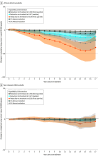Residential Segregation and Lung Cancer Risk in African American Adults
- PMID: 40591357
- PMCID: PMC12215573
- DOI: 10.1001/jamanetworkopen.2025.18481
Residential Segregation and Lung Cancer Risk in African American Adults
Abstract
Importance: Although structural racism as manifested by residential segregation is a documented root cause of race-based disparities in lung cancer survival and care, its impact on lung cancer development remains underexplored.
Objective: To examine the association between residential segregation and lung cancer incidence and to identify modifiable factors mediating this association.
Design, setting, and participants: This cohort study used data from the Southern Community Cohort Study (SCCS), which enrolled African American and non-Hispanic White participants who had no cancer at enrollment. The SCCS recruited participants from community health centers and random sampling from 12 southeastern states. Follow-up occurred between March 2002 to December 2019. Analysis was performed from April 2022 to March 2025.
Exposures: Residential segregation, measured by the isolation index using 2010 census block group data, was linked to participants' baseline address.
Main outcomes and measures: Incident lung cancer cases were identified via state cancer registries and the National Death Index (December 31, 2016, to December 31, 2019, depending on the state). Parametric g-computation estimated cumulative lung cancer risk under hypothetical interventions reducing residential segregation. Mediation analyses utilized inverse propensity weighting and marginal structural models to assess potential mediating pathways.
Results: The cohort comprised 71 634 participants (median [IQR] age, 50 [45-57] years; 42 032 [58.7%] female; 50 898 [71.1%] African American and 20 736 [28.9%] non-Hispanic White) enrolled between 2002 and 2009. All hypothetical scenarios of lowering the isolation index were associated with lower 17-year culminative incidence of lung cancer among African American individuals but not among non-Hispanic White individuals. Approximately 24.7% (95% CI, 17.1%-36.6%) of the association between residential segregation and lung cancer risk in African American participants was mediated by menthol smoking, 13.1% (95% CI, 3.2%-25.4%) by exposure to particulate matter with a diameter of 2.5 μm or less, 4.7% (95% CI, 1.3%-9.6%) by secondhand smoke exposure at home, and 4.6% (95% CI, 2.1%-7.7%) by education.
Conclusions and relevance: In this cohort study of non-Hispanic White and African American individuals, lower residential segregation was significantly associated with decreased lung cancer risk for African American individuals but not their non-Hispanic White counterparts. Mediation analysis identified mentholated smoking use and air pollution exposure as 2 major pathways between residential segregation and lung cancer incidence among African American adults. These findings suggest that lung cancer development reduction efforts should include policies with targetable segregation metrics and initiatives that lower exposure to documented mediators.
Conflict of interest statement
Figures



Comment in
- doi: 10.1001/jamanetworkopen.2025.18490
References
-
- American Cancer Society . Cancer facts & figures for African American/Black People 2022-2024. Accessed April 19, 2024. https://www.cancer.org/content/dam/cancer-org/research/cancer-facts-and-...
Publication types
MeSH terms
Grants and funding
LinkOut - more resources
Full Text Sources
Medical
Miscellaneous

